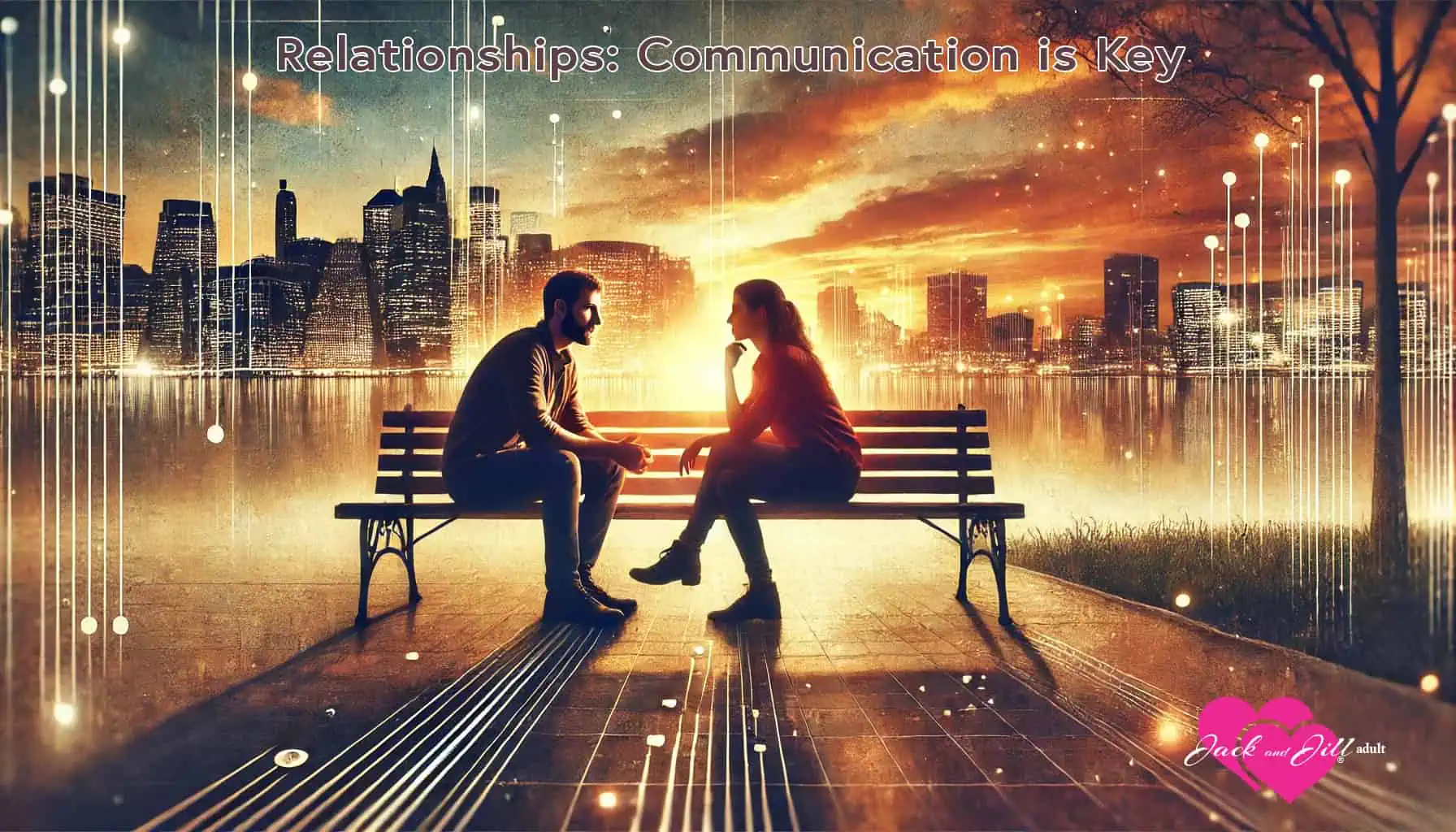
Relationships: Communication is Key
Relationships: Communication is Key. Communication is the cornerstone of any successful relationship. Open communication is the foundation upon which trust, intimacy, and understanding are built. In many relationships, however, whether romantic, familial, or friendships, the ability to communicate effectively can mean the difference between a thriving connection and one that struggles. When partners or friends communicate openly and honestly, they create a space where each person feels valued and understood.
Effective communication involves not just speaking but also listening. It’s about expressing your thoughts and feelings clearly and respectfully while also being open to hearing and understanding the other person’s perspective. Good communication helps to resolve conflicts, clarify misunderstandings, and build stronger, more meaningful connections. It allows individuals to share their joys, sorrows, dreams, and fears, thus fostering a deeper bond.
The Power of Effective Communication is Key

The power of effective relationships lies in the strength of the communication between the individuals involved in a satisfying relationship. Effective communication fosters a deeper level of emotional connection and understanding. It enables partners to navigate the complexities of life together and challenges and celebrate successes as a team.
When communication is vital, relationships are resilient. Partners who communicate well are better equipped to handle disagreements and conflicts, finding solutions that respect both parties’ needs and viewpoints. This mutual respect and collaboration reinforce their bond, making the relationship more robust and enduring.
Effective communication also enhances intimacy. By sharing thoughts and feelings openly, partners create an environment of trust and emotional safety. This openness leads to greater emotional closeness and physical intimacy, as both partners feel secure in their connection.
Moreover, good communication skills contribute to overall relationship satisfaction. When partners feel heard and understood, they are likelier to feel happy and fulfilled. This satisfaction, in turn, motivates them to invest further in their partnership, creating a positive cycle of communication and connection.
The power of effective relationships is rooted in the ability to communicate well. Clear communication is how partners build trust, navigate challenges, deepen intimacy, and achieve lasting satisfaction.
Understanding Communication in Relationships
Communication is the foundation of any successful relationship. It allows partners to share feelings, opinions, and expectations. Establishing an emotional connection through communication helps partners feel understood and valued. Emotional intimacy is crucial for fostering a deeper bond between partners.
Effective communication in a relationship helps build trust, intimacy, and a deeper understanding of each other’s needs and desires. Good communication skills are essential for navigating conflicts and challenges in a relationship. Communication in relationships is a two-way process that requires active listening, empathy, and understanding.
The Importance of Good Communication
Good communication is vital for building and maintaining healthy relationships, including romantic relationships, friendships, and relationships with family members. Effective communication helps prevent misunderstandings, resolve conflicts, and strengthen relationships. Emotional safety is also crucial in fostering a supportive and trusting relationship environment.
Effective communication is essential for creating a positive and supportive relationship environment. Communication is key to better understanding each other’s needs, desires, positive feelings, and boundaries, fostering an open dialogue.
Communication Breakdown and Its Consequences

Communication breakdowns can lead to misunderstandings, conflicts, and relationship breakdowns. When communication falters, partners are left to interpret each other’s or their partners’ thoughts, actions, and intentions, often leading to incorrect assumptions and misunderstandings. These misinterpretations can cause minor disagreements to escalate into significant conflicts, creating an environment of tension, mistrust, and emotional distress.
Signs of Poor Communication
Signs of poor communication include avoiding conversations, using hurtful language, and not actively listening to each other. Emotional withdrawal is another sign where one partner disengages emotionally from the relationship. When partners avoid discussing important issues, they miss the opportunity to address and resolve them, allowing problems to fester and grow.
Hurtful language can damage a partner’s self-esteem and create an atmosphere of hostility, making it difficult to have constructive discussions and not actively listening signals a lack of respect and concern for the partner’s perspective, whether through distraction, interruption, or dismissal.
Defensiveness, criticism, and stonewalling are also signs of poor communication. Defensiveness occurs when one partner feels attacked and responds by justifying their actions rather than addressing the concern. This often leads to blame and counter-blame.
Criticism, mainly when it targets a partner’s character rather than their behavior, can be deeply hurtful and erode trust. Stonewalling, or withdrawing from the conversation, shuts any chance of resolution and leaves issues unresolved, increasing frustration and resentment.
Emotional Impact of Poor Communication
Emotional disconnection can lead to resentment, frustration, and disconnection from romantic partners. When partners do not feel heard, they may withdraw emotionally, creating a gap in the relationship. Over time, this can lead to losing intimacy and weakening the emotional bond that holds the relationship together. The persistent feeling of not being valued can cause significant emotional distress and may even lead to one or both partners seeking solace outside the relationship.
Long-term Effects
The long-term effects of poor communication can be devastating. It can significantly affect emotional well-being, leading to isolation and frustration. Persistent unresolved conflicts can lead to chronic stress and anxiety, impacting both partners’ mental and physical health. The relationship may become characterized by ongoing strife and dissatisfaction, diminishing both individuals’ overall quality of life. In some cases, continued poor communication can end the relationship altogether, as partners may conclude that they are no longer compatible or capable of meeting each other’s needs.
Addressing Poor Communication

Recognizing and addressing poor communication is crucial for maintaining a healthy and fulfilling relationship. Emotional support is vital in fostering an environment where open, respectful dialogue is encouraged and both parties feel safe expressing their thoughts and feelings.
Developing practical communication skills, such as active listening and empathy, can significantly improve the quality of interactions and help prevent misunderstandings, arguments, and conflicts. By committing to continuous improvement in how they communicate, couples can strengthen their bond and navigate the challenges of their relationship with greater ease and understanding.
Developing Effective Communication Skills
Developing practical communication skills takes time and effort, but it’s essential for building solid relationships. Emotional intelligence plays a crucial role in understanding and managing emotions, which enhances communication. Active listening, showing empathy, and understanding are critical components of effective communication.
Practicing good communication skills, such as using “I” statements and nonverbal communication, can help improve relationships. Seeking feedback from your partner and being open to constructive criticism can also help improve communication.
Overcoming Communication Barriers
Communication barriers, such as communication styles and language differences, can hinder effective communication. Emotional resilience is essential in navigating and overcoming these challenges. Understanding cultural differences can also play a crucial role in overcoming these barriers.
Being aware of these barriers and trying to overcome them can help improve communication. Technology, such as video calls and messaging apps, can help bridge the distance in long-distance relationships. Seeking the help of a mental health professional can also help overcome any other communication problems, issues, and barriers.
Communication Styles
Assertive communication and other styles, such as passive and aggressive, can affect relationships. Emotional regulation plays a crucial role in managing these communication styles effectively. Understanding your communication style and your partner’s can help improve communication. Awareness of nonverbal communication, such as body language and tone of voice, can also help improve relationships. Healthy communication skills, such as active listening and empathy, can help create a positive relationship environment.
Building Strong Listening Skills

Active listening is a critical component of effective communication. Emotional awareness, which involves recognizing and understanding the emotions of others, is crucial in this process. Reflective listening, which consists of understanding and repeating the speaker’s words, can further enhance this skill. Practicing active listening skills, such as maintaining eye contact and avoiding distractions, can help improve relationships. Asking open-ended questions and seeking clarification can also help improve communication. Awareness of nonverbal cues, such as body language and tone of voice, can also help improve interpersonal relationships.
The Role of Technology in Communication
Digital and communication channels, including video calls and messaging apps, can help bridge the distance in long-distance relationships by fostering an emotional connection. However, over-reliance on technology can also hinder effective communication. Being aware of the limitations of technology and trying to communicate in person can help improve relationships. Setting boundaries around technology use can also help create a healthy relationship environment.
Working with a Therapist to Improve Communication
Working with a therapist can help improve communication skills and relationships. Emotional healing is often a vital component of this process. A therapist can help identify patterns of poor communication and provide communication strategies for improvement. Couples therapy can help improve communication and conflict-resolution skills.
Seeking the help of a licensed therapist for family therapy can also help overcome communication barriers.
Expert-Backed Tips for Improving Communication

Practicing good communication skills, such as active listening and empathy, can help improve relationships. Emotional growth is essential for enhancing communication skills and fostering more profound connections. Seeking feedback from your partner and being open to constructive feedback can also help improve communication.
Being aware of nonverbal cues, such as body language, relaxed posture, and tone of voice, can also help you communicate effectively and improve relationships. Setting boundaries and prioritizing communication can help create a healthy relationship environment.
Effective Communication in Long-Distance Relationships
Emotional closeness is essential in long-distance relationships. Using technology, such as video calls and messaging apps, effectively communicate and can help bridge the distance.
Practicing good communication, such as active listening and empathy, can help improve relationships. Setting boundaries and prioritizing communication can help create a healthy relationship environment for everyone.
Creating a Positive Communication Environment
Creating a supportive environment that fosters emotional safety is essential for building solid relationships. Practicing good conversational skills, such as active listening and empathy, can help improve relationships. Awareness of nonverbal cues, such as body language and tone of voice, can also help improve relationships. Setting boundaries and prioritizing communication can help create a healthy relationship environment.
Setting and Respecting Boundaries
Setting and respecting boundaries is crucial for maintaining a healthy and fulfilling relationship. Emotional boundaries are essential for ensuring that both partners feel safe and respected. Clear boundaries help partners understand each other’s limits and create a sense of safety and mutual respect. Discussing and agreeing on boundaries can prevent misunderstandings and conflicts, making your relationship more robust and harmonious.
Balancing Togetherness with Personal Space
Balancing togetherness with personal space is essential for a healthy relationship. Emotional independence is crucial as it allows each partner to maintain their individuality while being part of a couple. Spending quality time together strengthens your bond, but having time for yourself is also essential.
Personal space allows for individual growth and prevents feelings of suffocation or resentment. Finding the right balance of other space can lead to a more satisfying and supportive relationship.
Negotiating Needs and Expectations

Open communication about emotional needs and expectations is vital to any relationship. Discussing your desires and goals openly helps prevent misunderstandings and ensures both partners feel heard and valued. Regularly revisiting these discussions can help adapt to changes in the relationship and maintain a strong connection.
This continuous dialogue allows both partners to stay aligned, addressing evolving needs or shifting priorities, and reinforces mutual respect and support. By using common ground and maintaining an open line of communication, couples can navigate life’s challenges together, fostering a deeper bond and a more resilient partnership.
Conclusion
Emotional fulfillment is critical to both relationship satisfaction and building and maintaining healthy relationships. Practicing good communication skills, such as active listening and empathy, can help improve relationships. Awareness of nonverbal cues, such as body language and tone of voice, can also help improve relationships. Seeking the help of a therapist can also help improve communication and relationships.
This revised structure ensures that the content is logically organized, avoids unnecessary repetition, and places the conclusion appropriately at the end.